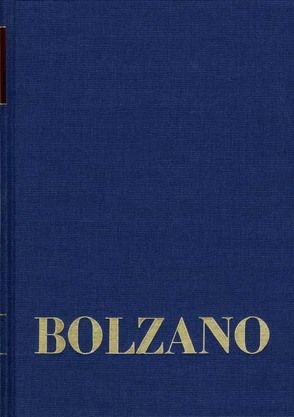
In this academic year, Bolzano persevered with his series of fundamental reforms. He began by explaining why these were necessary: It was time to replace superstition and error with a sensible faith in God and a religious enlightenment. The aim of this was to create better conditions for human beings in his native country Bohemia and ultimately everywhere on earth. He saw this as a task which could be accomplished with the combined efforts of all those who together were willing to stand up for the “good cause of mankind.” Alliances of this nature were however observed with increasing distrust by the Austrian state. This was understandable, since in his work for a better society Bolzano was pressing for social justice in all forms, was calling for a “more reasonable“ constitution, wanted to replace hereditary nobility with nobility of mind etc. His statements indicating that anyone who did not make every effort to support the common good did not deserve to live as far as he was concerned show how radical his thinking was in these issues. He condemned the misuse of intelligence such as ”deceiving the world because it wanted to be deceived,“ as well as the abuse of religion. He recognized the excessive enthusiasm with which mainly those who were wise in the ways of the world or the romantics in Germany were afflicted in his time as a dangerous kind of rampant scientific uncertainty. He was not grimly determined in his way of doing things, but rather of a “cheerful disposition.”
Aktualisiert: 2023-03-14
> findR *
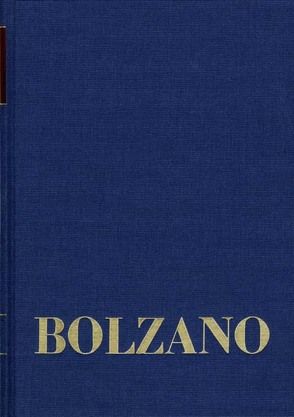
On the third Sunday in November of 1817, Bernard Bolzano began the twelfth annual cycle of his edification speeches. In this academic year he began by dealing with the students’ responsibility to their parents and teachers but also to the opposite (female) sex and the society of mankind as a whole. In four of his speeches, he paid particular attention to the virtue of unselfishness. For Bolzano, the reasonable substantiation of the Christian religion was just as important, since it transcended natural religion in that it could not be explained completely by reason. Again and again Bolzano drew a new boundaries between natural religion and the Christian religion in a constant effort to ultimately establish these precisely. Bolzano‘s attempt to combine faith and reason ended in a balancing act. Although this was admired by some, many however viewed it with suspicion, misunderstood it and increasingly rejected it openly. This was one of the reasons for Bolzano to speak also of “the advantages and dangers in the precoccupation with ideals“ and to draw up clear rules for the creation and application of ideas. In spite of all these difficulties, Bolzano tried to obtain a view of a better world by developing an appreciation of beauty.
Aktualisiert: 2022-08-18
> findR *
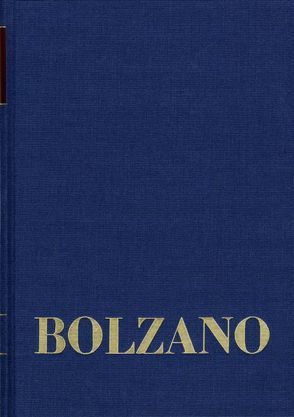
From 1805 to 1820, Bernard Bolzano was professor of »religious doctrine« (Religionslehre) at the University of Prague. The lectures he had to deliver were part of the so-called »Philosophical Studies« that every student of the university had to complete before he entered the »higher« studies, i.e. the studies of medicine, law or theology. As professor of religious doctrine, Bolzano also had the duty to deliver the homilies on Sundays and holidays during the academic year to all the students of the »Philosophical Studies«. This explains the enormous influence Bolzano exerted through these homilies on the intellectual and political life of Bohemia in his time, whose offshoots reached even the Charta 77 movement in former Czechoslovakia. The chairs of religious doctrine were established by the Austrian emperor Franz at all universities of the Austrian empire in order to shape the students into »good Christians and law-abiding citizens« as it was ordered in a decree. The homilies Bolzano had to deliver at the University of Prague (as did all professors of religious doctrine at Austrian universities) were called ›Erbauungsreden‹ (edifying addresses) or ›exhortations‹. There is evidence for 582 ›Erbauungsreden‹ Bolzano delivered as a professor at the University of Prague of which 414 are extant; of these, 153 have not yet been published at all. The 414 ›Erbauungsreden‹ that are extant have survived in different form: some of them (70) as autographs, i.e. in Bolzano’s own handwriting, others in handwritten copies of Bolzano’s manuscripts, others in notes taken by Bolzano’s students. Several collections of Bolzano’s ›Erbauungsreden‹ have already appeared in print, some of them during Bolzano’s lifetime, while others were published posthumously by his students or other editors. – The new critical edition of Bolzano’s ›Erbauungsreden‹ presents all of them in chronological order. Those which are extant will be edited on the basis of the best version which has remained. Those ›Erbauungsreden‹ which are not extant will be documented and described according to an index Bolzano himself has prepared.
Bolzano held more edification speeches in the academic year 1809/1810 that in any other year in which he was teaching. During this time he held 52 of these speeches. Six speeches have been preserved as autographs, there are only notes for four of the speeches, and only the dates are known for two of the speeches. Most of the others are still in existence as transcripts reproduced in facsimile. In the edification speeches held in the academic year 1809/1810, Bolzano’s concept of education, which includes the entire personality, is shown especially clearly. There are twice as many speeches which have a generally advisory content than there are speeches which deal mainly with religious issues.
Aktualisiert: 2022-08-18
> findR *
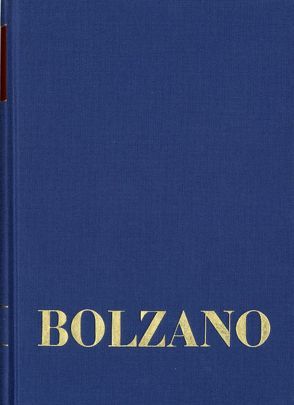
From 1805 to 1820, Bernard Bolzano was professor of »religious doctrine« (Religionslehre) at the University of Prague. The lectures he had to deliver were part of the so-called »Philosophical Studies« that every student of the university had to complete before he entered the »higher« studies, i.e. the studies of medicine, law or theology. As professor of religious doctrine, Bolzano also had the duty to deliver the homilies on Sundays and holidays during the academic year to all the students of the »Philosophical Studies«. This explains the enormous influence Bolzano exerted through these homilies on the intellectual and political life of Bohemia in his time, whose offshoots reached even the Charta 77 movement in former Czechoslovakia. The chairs of religious doctrine were established by the Austrian emperor Franz at all universities of the Austrian empire in order to shape the students into »good Christians and law-abiding citizens« as it was ordered in a decree. The homilies Bolzano had to deliver at the University of Prague (as did all professors of religious doctrine at Austrian universities) were called ›Erbauungsreden‹ (edifying addresses) or ›exhortations‹. There is evidence for 582 ›Erbauungsreden‹ Bolzano delivered as a professor at the University of Prague of which 414 are extant; of these, 153 have not yet been published at all. The 414 ›Erbauungsreden‹ that are extant have survived in different form: some of them (70) as autographs, i.e. in Bolzano’s own handwriting, others in handwritten copies of Bolzano’s manuscripts, others in notes taken by Bolzano’s students. Several collections of Bolzano’s ›Erbauungsreden‹ have already appeared in print, some of them during Bolzano’s lifetime, while others were published posthumously by his students or other editors. – The new critical edition of Bolzano’s ›Erbauungsreden‹ presents all of them in chronological order. Those which are extant will be edited on the basis of the best version which has remained. Those ›Erbauungsreden‹ which are not extant will be documented and described according to an index Bolzano himself has prepared.
Due to the increasing popularity of the edification speeches, 41 of the 51 speeches which Bolzano held in the academic year 1808/09 have been handed down as transcripts and 7 of them as written notes, most of them several times. Two of these are autographs. There are only three texts (numbers 1, 2 and 4) which were lost and these are documented in an autographic index. The ratio of homiletic speeches to generally edifying speeches was the opposite of the first four years (and remained this way until the end of Bolzano’s professional career): Approximately one third of the speeches dealt with exegesis, primarily on important church holidays, and two thirds dealt with educational, ideological and political subjects.
Aktualisiert: 2022-08-18
> findR *
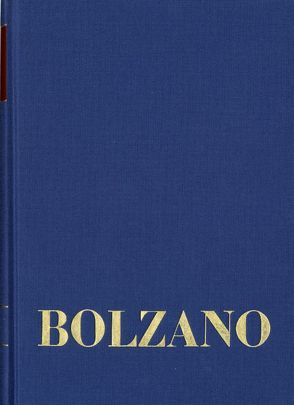
From 1805 to 1820, Bernard Bolzano was professor of »religious doctrine« (Religionslehre) at the University of Prague. The lectures he had to deliver were part of the so-called »Philosophical Studies« that every student of the university had to complete before he entered the »higher« studies, i.e. the studies of medicine, law or theology. As professor of religious doctrine, Bolzano also had the duty to deliver the homilies on Sundays and holidays during the academic year to all the students of the »Philosophical Studies«. This explains the enormous influence Bolzano exerted through these homilies on the intellectual and political life of Bohemia in his time, whose offshoots reached even the Charta 77 movement in former Czechoslovakia. The chairs of religious doctrine were established by the Austrian emperor Franz at all universities of the Austrian empire in order to shape the students into »good Christians and law-abiding citizens« as it was ordered in a decree. The homilies Bolzano had to deliver at the University of Prague (as did all professors of religious doctrine at Austrian universities) were called ›Erbauungsreden‹ (edifying addresses) or ›exhortations‹. There is evidence for 582 ›Erbauungsreden‹ Bolzano delivered as a professor at the University of Prague of which 414 are extant; of these, 153 have not yet been published at all. The 414 ›Erbauungsreden‹ that are extant have survived in different form: some of them (70) as autographs, i.e. in Bolzano’s own handwriting, others in handwritten copies of Bolzano’s manuscripts, others in notes taken by Bolzano’s students. Several collections of Bolzano’s ›Erbauungsreden‹ have already appeared in print, some of them during Bolzano’s lifetime, while others were published posthumously by his students or other editors. – The new critical edition of Bolzano’s ›Erbauungsreden‹ presents all of them in chronological order. Those which are extant will be edited on the basis of the best version which has remained. Those ›Erbauungsreden‹ which are not extant will be documented and described according to an index Bolzano himself has prepared.
Due to the increasing popularity of the edification speeches, 41 of the 51 speeches which Bolzano held in the academic year 1808/09 have been handed down as transcripts and 7 of them as written notes, most of them several times. Two of these are autographs. There are only three texts (numbers 1, 2 and 4) which were lost and these are documented in an autographic index. The ratio of homiletic speeches to generally edifying speeches was the opposite of the first four years (and remained this way until the end of Bolzano’s professional career): Approximately one third of the speeches dealt with exegesis, primarily on important church holidays, and two thirds dealt with educational, ideological and political subjects.
Aktualisiert: 2022-08-18
> findR *
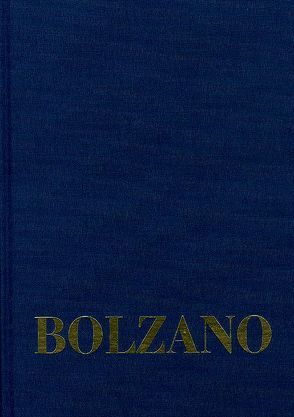
From 1805 to 1820, Bernard Bolzano was professor of »religious doctrine« (Religionslehre) at the University of Prague. The lectures he had to deliver were part of the so-called »Philosophical Studies« that every student of the university had to complete before he entered the »higher« studies, i.e. the studies of medicine, law or theology. As professor of religious doctrine, Bolzano also had the duty to deliver the homilies on Sundays and holidays during the academic year to all the students of the »Philosophical Studies«. This explains the enormous influence Bolzano exerted through these homilies on the intellectual and political life of Bohemia in his time, whose offshoots reached even the Charta 77 movement in former Czechoslovakia. The chairs of religious doctrine were established by the Austrian emperor Franz at all universities of the Austrian empire in order to shape the students into »good Christians and law-abiding citizens« as it was ordered in a decree. The homilies Bolzano had to deliver at the University of Prague (as did all professors of religious doctrine at Austrian universities) were called ›Erbauungsreden‹ (edifying addresses) or ›exhortations‹. There is evidence for 582 ›Erbauungsreden‹ Bolzano delivered as a professor at the University of Prague of which 414 are extant; of these, 153 have not yet been published at all. The 414 ›Erbauungsreden‹ that are extant have survived in different form: some of them (70) as autographs, i.e. in Bolzano’s own handwriting, others in handwritten copies of Bolzano’s manuscripts, others in notes taken by Bolzano’s students. Several collections of Bolzano’s ›Erbauungsreden‹ have already appeared in print, some of them during Bolzano’s lifetime, while others were published posthumously by his students or other editors. – The new critical edition of Bolzano’s ›Erbauungsreden‹ presents all of them in chronological order. Those which are extant will be edited on the basis of the best version which has remained. Those ›Erbauungsreden‹ which are not extant will be documented and described according to an index Bolzano himself has prepared.
In Bernard Bolzano’s first four academic years as a professor at the University of Prague he held 169 edification speeches, of which however only 13 have been preserved. An index which Bolzano compiled himself does however provide information on the content of all the other edification speeches held during this time. This volume contains a complete documentation of all the edification speeches which Bolzano held up to the end of the academic year 1807/08.
Aktualisiert: 2023-03-14
> findR *
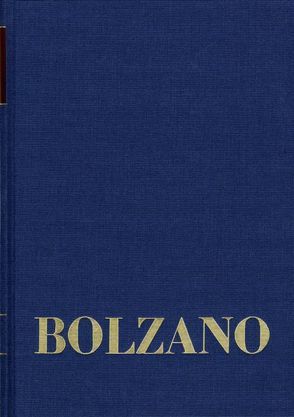
From 1805 to 1820, Bernard Bolzano was professor of »religious doctrine« (Religionslehre) at the University of Prague. The lectures he had to deliver were part of the so-called »Philosophical Studies« that every student of the university had to complete before he entered the »higher« studies, i.e. the studies of medicine, law or theology. As professor of religious doctrine, Bolzano also had the duty to deliver the homilies on Sundays and holidays during the academic year to all the students of the »Philosophical Studies«. This explains the enormous influence Bolzano exerted through these homilies on the intellectual and political life of Bohemia in his time, whose offshoots reached even the Charta 77 movement in former Czechoslovakia. The chairs of religious doctrine were established by the Austrian emperor Franz at all universities of the Austrian empire in order to shape the students into »good Christians and law-abiding citizens« as it was ordered in a decree. The homilies Bolzano had to deliver at the University of Prague (as did all professors of religious doctrine at Austrian universities) were called ›Erbauungsreden‹ (edifying addresses) or ›exhortations‹. There is evidence for 582 ›Erbauungsreden‹ Bolzano delivered as a professor at the University of Prague of which 414 are extant; of these, 153 have not yet been published at all. The 414 ›Erbauungsreden‹ that are extant have survived in different form: some of them (70) as autographs, i.e. in Bolzano’s own handwriting, others in handwritten copies of Bolzano’s manuscripts, others in notes taken by Bolzano’s students. Several collections of Bolzano’s ›Erbauungsreden‹ have already appeared in print, some of them during Bolzano’s lifetime, while others were published posthumously by his students or other editors. – The new critical edition of Bolzano’s ›Erbauungsreden‹ presents all of them in chronological order. Those which are extant will be edited on the basis of the best version which has remained. Those ›Erbauungsreden‹ which are not extant will be documented and described according to an index Bolzano himself has prepared.
Bolzano held more edification speeches in the academic year 1809/1810 that in any other year in which he was teaching. During this time he held 52 of these speeches. Six speeches have been preserved as autographs, there are only notes for four of the speeches, and only the dates are known for two of the speeches. Most of the others are still in existence as transcripts reproduced in facsimile. In the edification speeches held in the academic year 1809/1810, Bolzano’s concept of education, which includes the entire personality, is shown especially clearly. There are twice as many speeches which have a generally advisory content than there are speeches which deal mainly with religious issues.
Aktualisiert: 2022-08-18
> findR *
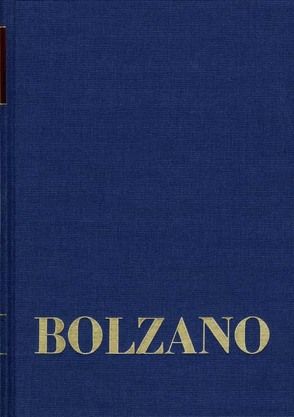
In this academic year, Bolzano persevered with his series of fundamental reforms. He began by explaining why these were necessary: It was time to replace superstition and error with a sensible faith in God and a religious enlightenment. The aim of this was to create better conditions for human beings in his native country Bohemia and ultimately everywhere on earth. He saw this as a task which could be accomplished with the combined efforts of all those who together were willing to stand up for the “good cause of mankind.” Alliances of this nature were however observed with increasing distrust by the Austrian state. This was understandable, since in his work for a better society Bolzano was pressing for social justice in all forms, was calling for a “more reasonable“ constitution, wanted to replace hereditary nobility with nobility of mind etc. His statements indicating that anyone who did not make every effort to support the common good did not deserve to live as far as he was concerned show how radical his thinking was in these issues. He condemned the misuse of intelligence such as ”deceiving the world because it wanted to be deceived,“ as well as the abuse of religion. He recognized the excessive enthusiasm with which mainly those who were wise in the ways of the world or the romantics in Germany were afflicted in his time as a dangerous kind of rampant scientific uncertainty. He was not grimly determined in his way of doing things, but rather of a “cheerful disposition.”
Aktualisiert: 2023-03-14
> findR *
MEHR ANZEIGEN
Bücher zum Thema Exhortationen
Sie suchen ein Buch über Exhortationen? Bei Buch findr finden Sie eine große Auswahl Bücher zum
Thema Exhortationen. Entdecken Sie neue Bücher oder Klassiker für Sie selbst oder zum Verschenken. Buch findr
hat zahlreiche Bücher zum Thema Exhortationen im Sortiment. Nehmen Sie sich Zeit zum Stöbern und finden Sie das
passende Buch für Ihr Lesevergnügen. Stöbern Sie durch unser Angebot und finden Sie aus unserer großen Auswahl das
Buch, das Ihnen zusagt. Bei Buch findr finden Sie Romane, Ratgeber, wissenschaftliche und populärwissenschaftliche
Bücher uvm. Bestellen Sie Ihr Buch zum Thema Exhortationen einfach online und lassen Sie es sich bequem nach
Hause schicken. Wir wünschen Ihnen schöne und entspannte Lesemomente mit Ihrem Buch.
Exhortationen - Große Auswahl Bücher bei Buch findr
Bei uns finden Sie Bücher beliebter Autoren, Neuerscheinungen, Bestseller genauso wie alte Schätze. Bücher zum
Thema Exhortationen, die Ihre Fantasie anregen und Bücher, die Sie weiterbilden und Ihnen wissenschaftliche
Fakten vermitteln. Ganz nach Ihrem Geschmack ist das passende Buch für Sie dabei. Finden Sie eine große Auswahl
Bücher verschiedenster Genres, Verlage, Autoren bei Buchfindr:
Sie haben viele Möglichkeiten bei Buch findr die passenden Bücher für Ihr Lesevergnügen zu entdecken. Nutzen Sie
unsere Suchfunktionen, um zu stöbern und für Sie interessante Bücher in den unterschiedlichen Genres und Kategorien
zu finden. Unter Exhortationen und weitere Themen und Kategorien finden Sie schnell und einfach eine Auflistung
thematisch passender Bücher. Probieren Sie es aus, legen Sie jetzt los! Ihrem Lesevergnügen steht nichts im Wege.
Nutzen Sie die Vorteile Ihre Bücher online zu kaufen und bekommen Sie die bestellten Bücher schnell und bequem
zugestellt. Nehmen Sie sich die Zeit, online die Bücher Ihrer Wahl anzulesen, Buchempfehlungen und Rezensionen zu
studieren, Informationen zu Autoren zu lesen. Viel Spaß beim Lesen wünscht Ihnen das Team von Buchfindr.







